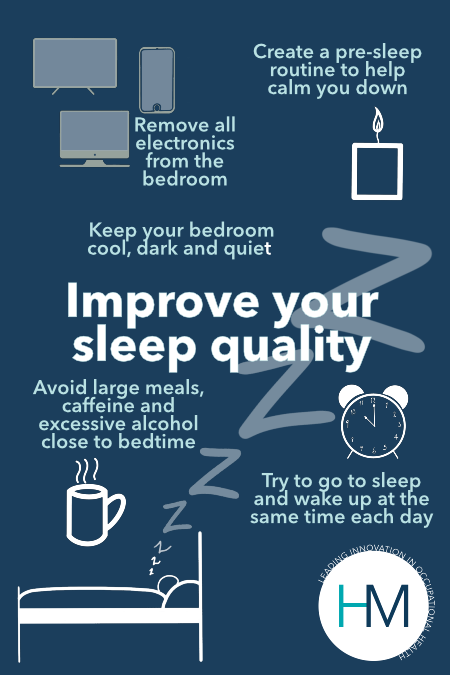
If, like many adults, you wake up still tired and groggy and looking forward to returning to bed…you are likely not getting enough sleep. Adults need around 8 hours of good sleep every night and not many get it.
Lack of sleep can lead to fatigue, short temper, lack of focus and eventually can lead to more serious effects such as depression, obesity, high blood pressure, heart disease and diabetes.
Sleep is the body’s time to recover from everything it has been put through physically and mentally throughout the day, this is done by your immune system producing a type of protein that targets inflammation and infection called cytokines. Without sufficient sleep, your body produces and releases fewer cytokines meaning less recovery for your body.
Create a pre-sleep routine to help you calm down
- Make a list of anything that needs to be done the next day- this will allow your mind to relax rather than trying to remember
- Relaxation exercises such as light yoga stretches to help relax the muscles
- A warm bath to help the body reach a comfortable temperature (not too hot)
- Reading a book, or listening to an audio book
- There are several apps with short stories and calming sounds to help you fall asleep
Remove all electronics from the bedroom
Bright and noisy electronics can be distracting when trying to sleep. Blue light from TV, smart phone or tablet screens may have a negative affect on sleep.
Keep your bedroom cool, dark and quiet
It can be very difficult to sleep in a warm environment. Studies have revealed that increased body temperature can decrease sleep quality so keeping your bedroom nice and cool can really help you get a better nights sleep.
This also goes for light and noise, both of which can be found disruptive to deep sleep.
Avoid large meals, caffeine and excessive alcohol close to bedtime
A late night meal, coffee or glass of wine might be hindering your sleep quality.
Give yourself enough time to digest your food before trying to sleep by eating earlier in the evening.
Caffeine (which can stay elevated in your blood for 6-8 hours) stimulates your nervous system and can disrupt natural relaxation at night.
Alcohol can reduce nighttime melatonin production which could lead to disrupted sleep patterns and negatively affect your hormones.
Try to go to sleep and wake up at the same time each day
Your body naturally aligns itself with sunrise and sunset, working on a loop called your circadian rhythm. Going to bed and waking up at similar times everyday can aid the consistency of your circadian rhythm helping you to get better quality sleep.






One reply on “Improve your sleep quality”
[…] Find more information about improving your sleep quality here. […]